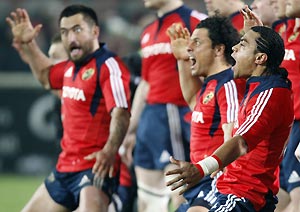
At the end of the enthralling, emotion-charged Munster 16-All Blacks 18 match, one of the commentators claimed that it was the greatest night of rugby he’d ever experienced. He was not far far off the mark.
Like the famous Randwick-All Black encounter at Coogee Oval some decades earlier, this match will live in the collective memories of Munster rugby people and New Zealanders as long as rugby is played in Ireland.
The highly- charged atmosphere received further ignition before the match when the four New Zealanders playing for Munster did their Haka before their team stood in a solid line, arms locking the line in tight, to confront the All Blacks Haka.
Again, the commentators noted how splendid the challenge was, and the stoic, strong way it was confronted by the Munster players. Just an hour or so before this happened, I read a column in The Guardian by Frank Keating saying that it was time to drop the Haka, that it was a hysterical nonsense.
Keating is one my heroes as a sports writer.
I sat beside him when Wales played the All Blacks in 1978 at Cardiff while he puffed his pipe and watched and didn’t take notes. On the Monday, there was a scintillating piece on the Test.
But on the Haka issue he is totally wrong.
He seems to think, incidentally, that in 1905 and on other tours when the Haka was performed, that the All Blacks were an all-white Pakeha team. Someone should tell him that the vice-captain of the 1905 All Blacks, Billy Stead (the co-author with Dave Gallaher of the best rugby book ever written, The New Zealand System of Rugby) was Maori.
I’d be surprised if there has ever been an All Blacks touring side without some Maori players in it, except, of course, on those tours to South Africa up to 1976.
The match itself was a terrific contest, with the red-shirted Munster players pouring into the rucks and mauls like giant spurts of red blood smothering their black opponents.
And with Paul Warwick, the five-eighths, kicking his goals and running the backline far more competently than Ronan O’Gara, the first choice Munster distributor, Munster kept the New Zealand defence under constant pressure.
At half-time the scoreline was Munster 16-New Zealand 10, and Munster fully deserved their strong lead.
Then, for the fourth successive time, the All Blacks held their opponents scoreless in the the second half, kicked a penalty early on (after Stephen Donald had missed four reasonably easy kicks at goal) and with minutes left to play, Joe Rokocovo burst through two tackles to score wide out.
Munster had one more chance to win the bragging rights for the next 30 years when they forced a turnover on the halfway with time up. But Warwick, for reasons that remain inexplicable, though perhaps sheer, overwhelming tiredness is the answer, kicked the ball into touch.
A fascinating aspect of the All Blacks try was that it followed a tremendous rolling maul.
The All Blacks marched forward something like 20 metres before putting the ball wide. A couple of phases later, Rokocovo was making his dash for the tryline.
The point here is that because the maul can now be pulled down under the ELVs, a well-constructed, reasonably fast-moving maul can still be very effective.
The All Blacks seem to be the only team in the world right now that has twigged to this.
The other, perhaps more important observation from the match, is that mid-week games against touring international sides provide a wonderful chance for local heroes to emerge. The members of that winning 1978 Munster side are legends in their province and were lined in the best seats of the grandstand for the crowd to admire.
I covered that 1978 tour of Graham Mourie’s All Blacks for a New Zealand magazine.
It was the first All Blacks side to win the Grand Slam. But my abiding memory, which I wrote about at length in my first rugby book, After The Final Whistle, was those mid-week matches through England, Wales and Ireland, including a memorable match at Belfast where the players and the journalists had to be taken to and from the ground in armoured buses.
Those Wallaby tours, too, when the team was away for months, provided so many memorable moments and stories.
In 1984, on Australia’s first Grand Slam tour, the Wallabies played a night match at Swansea. This dour, dinghy Welsh town has been immortalised in the full-lipped, sensuous prose of Dylan Thomas.
But it is really the a**hole of the earth.
The Wallabies were so reluctant to spend any more time than necessary in this awful place that they booked a bus to take them back to London after the match. The small contingent of Australian journalists covering the tour were told they could come back with the team on the bus.
So in the bitter cold, with slanting rain like hard nails pelting into anyone not under cover, the players and the scribes made their way quickly into the bus, past the coach Alan Jones, who was standing by the driver.
Jones was having a feud at the time with arguably Australia’s best rugby-writer and multiple Walkey winner, Evan Whitton.
Saturated and pleased to finally get inside the warm bus, Whitton was told curtly by Jones: “Not you. Out.”
Other journalists on the bus told me that it was so cold and miserable outside, any thoughts of supporting Whitton by joining him by way of a protest at the callousness of Jones were quickly eliminated by the sight of the indomitable reporter trudging his way though the dark and sleety rain back into town.
Bring back touring, I say, for the local and international players, for the supporters, and for the reporters, even if there are sometimes hardships that have to be endured when things are written that the powers don’t like to read.





























































































